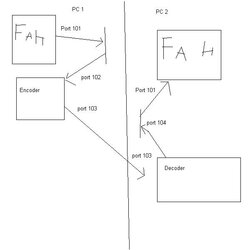- Joined
- Jun 8, 2005
Gentoo 2.6.20 patched with kerrighed 2.3.0.
Now, this isn't for me, but for another member who needs help in this. Now, he got a cluster of PCs and he got a FAH client on all of them. He wants to compress all data going in and out of FAH.
I was thinking among the lines of least resistance: two iptable entries, one routing all FAH sends to another port where a program encodes it. Another entry routes all FAH receives to a decoder which then passes it to FAH.
Will the following solution work?
PseudoCode
And here is a diagram:
Now, this isn't for me, but for another member who needs help in this. Now, he got a cluster of PCs and he got a FAH client on all of them. He wants to compress all data going in and out of FAH.
I was thinking among the lines of least resistance: two iptable entries, one routing all FAH sends to another port where a program encodes it. Another entry routes all FAH receives to a decoder which then passes it to FAH.
Will the following solution work?
PseudoCode
Code:
int main()
{
//register ports
char *buffer = (char*) malloc(sizeof(char)*4096);
while(true)
{
//if recieve data on port 1
//then
sendData(port2,(int)encode(buffer), buffer);
//encode(buffer) returns number of ints after encoding
//if recieves data on port 2
//then
sendData(port1,(int)decode(buffer), bufffer);
// will have to do some playing around with messages split.
}
}And here is a diagram:
